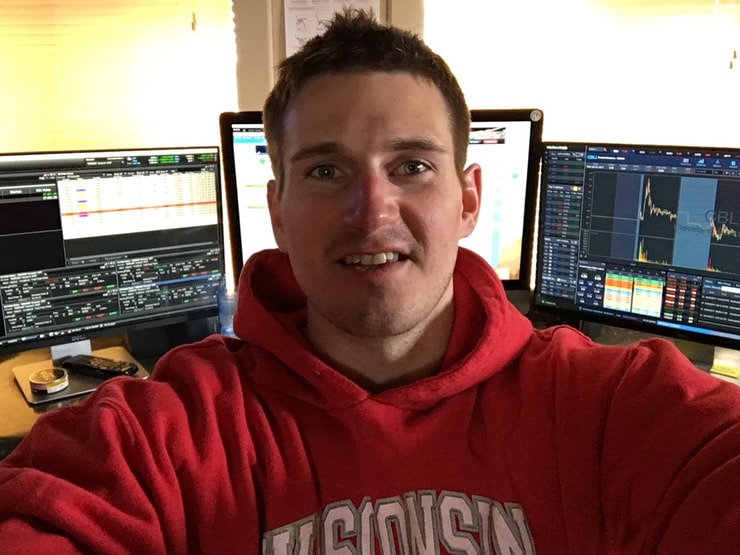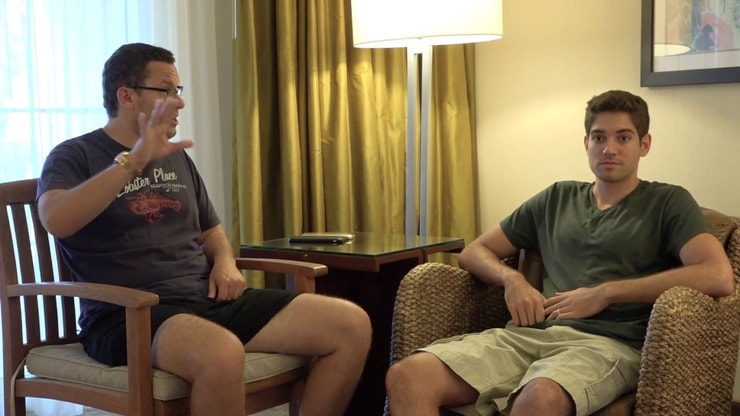…but what about upcoming newer students who might not have made that much yet, but are learning nicely and on the right track?
Most recently, I received a message from my trading challenge student Nick. Nick began his challenge in November 2016, and spent the next few months learning. His takeaways are great, and if you’ve just started the challenge or are thinking about applying to become a millionaire trading challenge student, this is a must read.
How bad do you want it? You are responsible for shaping your future. Success takes time and determination. It is earned, as few will be handed anything on that proverbial silver platter. Take a minute to focus on what it is that you desire and what steps you are going to take to get there. Have a plan and make it your mission to execute that plan. You will get discouraged along the way. Everybody falls down. It’s how you pick yourself back up which shapes you as an individual. Don’t make excuses. There is always somebody out there who has it much worse than you, and somehow finds a way to prevail. In summary – Attitude is everything.
Lesson #2 Reflect on the positive, grow from the negative
You have to be able to understand what your proficiencies and deficiencies are when it comes to trading. I’ll be the first to say that I’ve got an incredible distance to cover on my path to achieving consistency and success. I’ve been constantly expanding my trading journal throughout my short time traversing the market. If you don’t have a trade journal, start one now. At the very least, record your trades in detail on Profitly. This is crucial to the success of your journey. I spend a lot of time reviewing each of my trades and reflecting on my entries, exits, risk level, price targets, etc. This has helped to shape my trading going forward as I’m able to think back on the last time I traded something similar, and the outcome of that trade. The biggest losses I’ve taken have also taught me the most. Don’t be embarrassed about mistakes (or in my case – pure stupidity). Grow from it. If life isn’t about bettering yourself each day, then what is it all for?
More Breaking News
Lesson #3 Find what works best for you and capitalize on it
I had never traded a stock in my life prior to October of 2016. I really struggled during the first four months of the challenge, after getting accepted in November. There was an overwhelming amount to learn. It took me a long time to realize that I needed to break the different aspects of trading up into pieces and take it in stride. I watched video lesson after video lesson, focusing on one subject at a time while absorbing what I could about other aspects of the market. And I finally found my passion after discovering
short selling. Trading went from something I really enjoyed doing, to something I couldn’t get enough of. I had been getting out of bed each day around 4:30am Central time. This was after hitting the snooze button multiple times. After discovering the joys of short selling, I barely needed an alarm anymore. I continued to focus on shorting and finally pulled myself out of the red, achieving profits after months of struggle. That feeling was unlike any other. I’m finally starting to “see the light” because of it.
Find what your’e good at throughout the vastness of different trading strategies. Focus on it and work towards becoming consistent. Build your knowledge base and skill set off of that.
Lesson #4 Stay focused on your goal
Why did you decide to start trading? For me it was because I was tired of just getting by in life. I wanted more. I have a goal to become financially healthy. It is important to keep your goals in the forefront of your mind. Use it as motivation. Have short term, mid term, and long term goals. This has been a key factor in helping me grow not only in life, but with my trading. Each week I’ll set a goal and repetitively work towards it throughout the day, each day. This week my goal has been to respect risk. I’d taken a few big losses recently in not doing so. I’m working towards this goal day in and day out, in order to become more consistent.
By learning to work towards something specific, I’ve fine tuned my abilities.
Lesson #5 Protect your capital
This is one of the single most important aspects of trading. You must protect your capital. Holding and hoping is not the answer. Make a trade plan and stick to it. Cut your losses quickly when your plan doesn’t work out. Tim Grittani said something in one of his webinars that really hit home with me:
“Your job isn’t to trade but to manage risk – where are you risking off going into the trade and with how much on the line? That’s really all trading is.. putting yourself in high odds situations, and getting the hell out the times the situation fails. good trading is much more reactive than predictive.”
If that doesn’t sum it up, I don’t know what does.
Lesson #6 Never stop learning
Knowledge is everything. There are countless hours of material to learn from. I’ve always got a video lesson playing throughout the trading day, constantly absorbing everything I possibly can. As far as i’m concerned, you can never know enough. Never stop building and growing. Keep moving forward.
Thanks, Nick! If you have a list of lessons that you’d like the share, drop me a line so I can share it.




Leave a reply